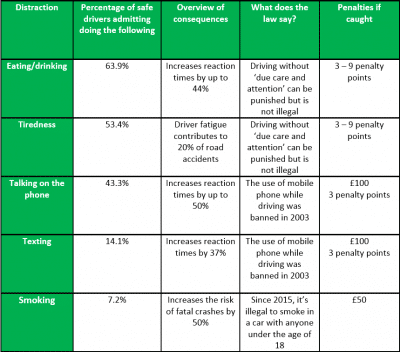Distractions cause Road Accidents!!! The Facts by the Professionals
https://www.aviva.co.uk/car-insurance/motor-advice/safe-driving/

Additional stats
· 24,582 people were killed or seriously injured on Britain’s roads in 2014 alone.
· According to a report from the Department for Transport, in 2014 there were a staggering 194,477 casualties in reported road traffic accidents in Britain.
80% of all respondents rated themselves as an 8/10 or above in terms of road safety.
· 63.9% of the self-proclaimed safe drivers admit to eating or drinking when driving, 57.4% confess to texting or talking on the phone while behind the wheel, 53.4% admit to struggling to stay awake, 7.2% said they smoke.
· 80% said that they do their best to follow the rules of the road, and 79% expressed that stiffer penalties should be enforced for people caught using mobile phones whilst driving.
· Only 7% of respondents believe mobile phones have the most negative effect on their driving safety.
· Texting can increase our reaction times by 37%, and reaction times can increase by up to 50% when talking on the phone.
· 99% of UK drivers don’t think smoking makes their driving less safe.
· According to the Thames Valley Police, “95% of all road crashes are due to human error.”
The survey revealed that only 7% of drivers think their own emotional state has the most negative effect on how they drive.
· Nearly two thirds of respondents believe anger has the worst influence on driving safety.
· A staggering 92% admit to feeling angry with other road users at some point when driving.
· Just over a quarter of us sometimes get stressed when driving.
· Only 19% of people believe that stress has the worst influence on driving safety.
The survey exposed that nearly 1 in 10 admitted that they often get nervous or fearful whilst driving, with only 4% believing it had the worst influence on driving safety.
Interview with Nick Lloyd, Road Safety Manager at Royal Society for the Prevention of Accidents (ROSPA)
According to you, what’s the worst type of distraction and why?
Objects, events, or activities both inside and outside the vehicle can cause distraction. In-vehicle distractions can be caused by technology, or by other sources inside the vehicle such as passengers. External distractions may be when a driver concentrates on unimportant events or objects, or when another person does something unusual.
It is difficult to say which is the most distracting as this may be determined by the distracted activity being undertaken and the cognitive complexity of the task. It is also important to recognise that some activities such as using a hand held mobile phone (which is obviously illegal) can create multiple types of distraction, in this case biomechanical, auditory and cognitive distraction. Using a hands-free phone whilst eliminating the biomechanical distraction will still involve an auditory distraction, and potentially a significant cognitive distraction, depending upon the subject of the conversation.
All driver distraction is potentially dangerous and RoSPA is not in a position to say which the worst is. However, it is vital that drivers realise that cognitive distraction occurs when a driver is thinking about something not related to driving the vehicle. Whilst performing a demanding cognitive task a driver’s visual field narrows both vertically and horizontally – meaning that rather than scanning the road for hazards, much more time is spent staring ahead than usual; in other words, tunnel vision. This means that drivers who are cognitively impaired will spend less time checking mirrors or looking around for hazards.
Do you think some people are more easily distracted than others?
There is no evidence to prove whether some people are more easily distracted than others. It may be more linked to individual personal awareness of the danger of distraction, levels of self control and willingness to break the law (in relation to using a handheld mobile phone which is a major form of driver distraction).
Pedestrian failed to look properly was the most common contributory factor allocated to pedestrian injuries (59%) in 2014. In a YouGov survey carried out in September 2014, 31% of those interviewed said that they have been distracted from looking for traffic as they were using their mobile phone. Anecdotal, this seems to be a particular issue associated with teenagers and young adults.
Interview with Mike Fisher, founder of The British Association of Anger Management and author of ‘Beating Anger’
What might cause someone to feel angry when in their car?
Many things cause people to be angry when in their car, whilst driving or as a passenger.
Usually the person who becomes angry is already feeling some form of irritation or stressor. All that happens in our vehicles is that everything becomes exaggerated and amplified. This often happens when some insensitive driver or person puts your life in danger, and this leads to you to justify being angry or expressing anger in that moment.
I often suggest that I did not become angry when someone cut me off, but perhaps it started a week ago when I argued with my wife or was told off by my boss, and this reflects an accumulation of stress and anger that’s often the main cause.
Interview with Neil Shah, director of The Stress Management Society and author of ‘The 10-Step Stress Solution’
What might cause someone to feel stressed when in their car?
There’s a broad variety of things which cause us to feel stressed – whether it’s spilling coffee down ourselves, being stuck in traffic, thinking about something that happened last night, or even driving to an interview or presentation.
Feeling stressed is a reaction to modern life. Nowadays we are overloaded with an overwhelming excess of demands, and if we reach a pressure point, it may be a case of ‘the straw that broke the camel’s back’.
Technology is one cause of this; with a constant flow of communication and information. Work used to start when you arrived at work and stop when you left, however due to our current use of technology, work begins the moment you open your eyes and check your device, through to when you go to sleep.
We have so much to absorb and think about during our time stuck in the car, and can feel stressed by the external factors of a commute, on top of everything else.
Interview with Laura Whitehurst at Anxiety UK
What might cause someone to feel anxious when in their car?
There are many reasons why somebody may feel anxious when in their car. For some, they may have had a negative experience when driving in the past – perhaps an accident – and as such the anxiety is caused by the notion of getting in another accident, or brings up frightening flashbacks of the accident whenever they go to get behind the wheel again.
Some people who are already living with a panic disorder, or have experienced panic attacks in the past, may be anxious about having a panic attack behind the wheel. Some may experience agoraphobia, and therefore may feel anxious about getting lost whilst driving, and driving outside of their ‘safe zone’, or some people may experience claustrophobia and find being stuck in traffic whilst driving very triggering of their own phobia.
There are a variety of different reasons why somebody may experience anxiety, and they will all experience their anxiety differently, however ultimately what it means for this person is that their anxiety could be interfering with their daily life, and this is when it needs to be addressed.









